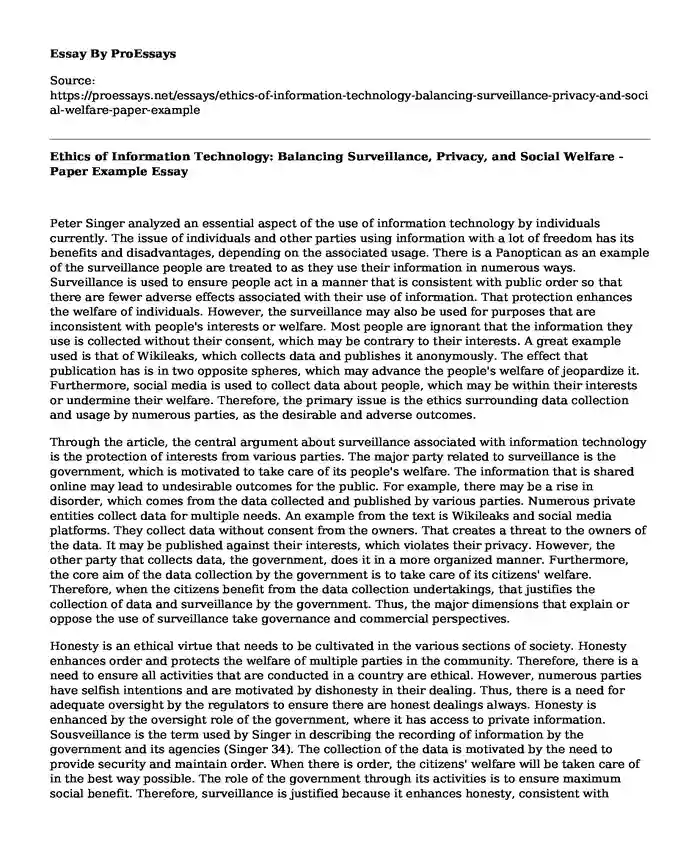Peter Singer analyzed an essential aspect of the use of information technology by individuals currently. The issue of individuals and other parties using information with a lot of freedom has its benefits and disadvantages, depending on the associated usage. There is a Panoptican as an example of the surveillance people are treated to as they use their information in numerous ways. Surveillance is used to ensure people act in a manner that is consistent with public order so that there are fewer adverse effects associated with their use of information. That protection enhances the welfare of individuals. However, the surveillance may also be used for purposes that are inconsistent with people's interests or welfare. Most people are ignorant that the information they use is collected without their consent, which may be contrary to their interests. A great example used is that of Wikileaks, which collects data and publishes it anonymously. The effect that publication has is in two opposite spheres, which may advance the people's welfare of jeopardize it. Furthermore, social media is used to collect data about people, which may be within their interests or undermine their welfare. Therefore, the primary issue is the ethics surrounding data collection and usage by numerous parties, as the desirable and adverse outcomes.
Through the article, the central argument about surveillance associated with information technology is the protection of interests from various parties. The major party related to surveillance is the government, which is motivated to take care of its people's welfare. The information that is shared online may lead to undesirable outcomes for the public. For example, there may be a rise in disorder, which comes from the data collected and published by various parties. Numerous private entities collect data for multiple needs. An example from the text is Wikileaks and social media platforms. They collect data without consent from the owners. That creates a threat to the owners of the data. It may be published against their interests, which violates their privacy. However, the other party that collects data, the government, does it in a more organized manner. Furthermore, the core aim of the data collection by the government is to take care of its citizens' welfare. Therefore, when the citizens benefit from the data collection undertakings, that justifies the collection of data and surveillance by the government. Thus, the major dimensions that explain or oppose the use of surveillance take governance and commercial perspectives.
Honesty is an ethical virtue that needs to be cultivated in the various sections of society. Honesty enhances order and protects the welfare of multiple parties in the community. Therefore, there is a need to ensure all activities that are conducted in a country are ethical. However, numerous parties have selfish intentions and are motivated by dishonesty in their dealing. Thus, there is a need for adequate oversight by the regulators to ensure there are honest dealings always. Honesty is enhanced by the oversight role of the government, where it has access to private information. Sousveillance is the term used by Singer in describing the recording of information by the government and its agencies (Singer 34). The collection of the data is motivated by the need to provide security and maintain order. When there is order, the citizens' welfare will be taken care of in the best way possible. The role of the government through its activities is to ensure maximum social benefit. Therefore, surveillance is justified because it enhances honesty, consistent with enhancing maximum social benefit within its jurisdiction.
Work Cited
Singer, Peter. "Visible Man: ethics in a world without secrets." Harper’s Magazine 34 (2011): 47. https://docplayer.net/31844586-Visible-man-ethics-in-a-world-without-secrets-by-peter-singer.html
Cite this page
Ethics of Information Technology: Balancing Surveillance, Privacy, and Social Welfare - Paper Example. (2023, Dec 29). Retrieved from https://proessays.net/essays/ethics-of-information-technology-balancing-surveillance-privacy-and-social-welfare-paper-example
If you are the original author of this essay and no longer wish to have it published on the ProEssays website, please click below to request its removal:
- Password Management. Research Antivirus Software. Kali Linux.
- How Does Interest Groups Influence the Policy-Making Process Essay
- Expository Essay on Cybercrime - Deepfakes
- Essay Example on Exploring Nietzsche's Meaning of Life
- U.S./Mexican Border and Homeland Security: Trump's Disputed Policies - Research Paper
- Essay on U.S. Incarceration: Rising Crime, War on Drugs, and Shifting Attitudes
- Sally's Obligation: Re-Educate Patient on Alprazolam Prescription - Essay Sample







